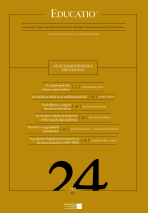Pedagógusbérek – mindig lent?
Teacher Salaries – Still Low?
Author(s): István PolónyiSubject(s): Education, Evaluation research, Socio-Economic Research
Published by: Akadémiai Kiadó
Keywords: teachers’ salaries; teachers’ salary system; prestige of the teaching profession;
Summary/Abstract: The study begins by stating that a key factor in the quality of education is the well-trained, capable teacher, and this is an essential condition for a good and suitable level of remuneration. Wages – that is, the wage differences for short-term and macro levels – will determine the allocation of labour, while micro level differences do have a motivating role. In the long run, however, there are associations here relating to the prestige of the occupation. Looked at from a historical perspective, teacher’s salaries, and especially high school teachers’ earnings, are very unfavourable – so teachers’ salary levels are significantly below the average salary for a graduate. In an international comparison, we can see that, in Hungary, teachers’ salaries were among the lowest in the OECD countries in 2013. A new teachers’ wage system was introduced in 2013 and, as a result, primary school teachers’ salaries will reach roughly 70% of the average salary for graduates in 2016, while high school teachers’ salaries will reach around 80% of a graduate’s average salary. Thus, Hungarian teachers’ wages were up 6-10 places in the OECD rankings list; so teachers will catch up with lecturers and even pharmacists in the rankings of domestic earnings – and this significant shift promises more prestige for the teaching profession. The question, of course, is how long will this earnings situation remain? And, in spite of pressures, can this teachers’ wage advantage be retained?
Journal: Educatio
- Issue Year: 24/2015
- Issue No: 1
- Page Range: 30-46
- Page Count: 17
- Language: Hungarian

